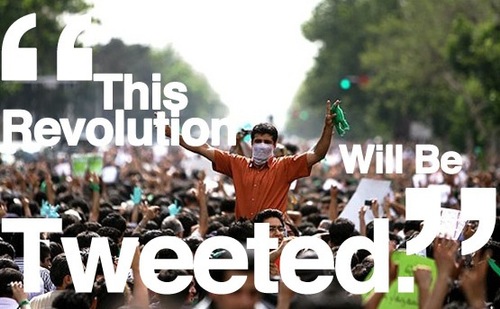The Real Net Effect: Top 10 Lessons from the Internet and the "Arab Spring" (Salatan)
 Tuesday, July 19, 2011 at 13:52 |
Tuesday, July 19, 2011 at 13:52 |  Scott Lucas in
Scott Lucas in  Africa,
Africa,  EA Global,
EA Global,  EA Middle East and Turkey,
EA Middle East and Turkey,  Middle East and Iran
Middle East and Iran  The latest feature in our running series "The Real Net Effect" on social media and political change --- William Salatan reports for Slate:
The latest feature in our running series "The Real Net Effect" on social media and political change --- William Salatan reports for Slate:
Dictators are toppling across the Arab world. What role has the Internet played in their demise? Last week, at a Future Tense forum sponsored by Slate, Arizona State University, and the New America Foundation, bloggers and activists from countries in turmoil, particularly in the Middle East, gathered to talk about how interactive media and social networks are influencing events on the ground. It was an instructive exchange. Here's a sampling of what I learned.
1. Technology doesn't guarantee revolution. Neither does poverty. Katherine Zoepf, a New America fellow, pointed out that Internet penetration is much higher in Persian Gulf countries than in Egypt or Syria. Yet Egypt and Syria have experienced uprisings, while Saudi Arabia hasn't. Why? The obvious guess is oil money, which can buy a better standard of living for Saudis so they feel less urgency to change their government. Ahmed Al Omran, a Saudi blogger, said the oil money won't last forever and won't solve all the country's problems. But he conceded it's "buying time" for the regime. So maybe you need poverty to push people into rebellion.
On the other hand, sometimes poverty impedes revolution by impeding access to technology. Oula Alrifai, a Syrian activist, and Mary Jo Porter, a translator for Cuban bloggers, explained how expensive and awkward Internet access is in those countries. In Syria, home Internet access is too pricey for most people, so they have to log in at Internet cafes, where the government can monitor them. In Cuba, two hours of Internet access at a café costs $20—a full month's wages—and a single text message costs $1. North Korea is even worse. Marcus Noland, deputy director of the Peterson Institute for International Economics, said the country lacks the telecommunications capacity to sustain much Internet traffic with the outside world, even if the regime were to allow it.
2. The medium can lead to the message. I thought Arab bloggers began with grievances and turned to the Internet to address them. But sometimes, apparently, it's the other way around. Al Omran said he started blogging just to practice his English. Once online, he met bloggers outside Saudi Arabia, learned about politics, and developed an interest in human rights. He said the same thing has happened to other bloggers in the region. Merlyna Lim, a scholar of social transformation at Arizona State University, described a similar dynamic in Egypt: Young people went online to keep up with their friends and youth culture. In doing so, they became politicized.
3. Online crowd dynamics mimic offline crowd dynamics. In Egypt, said Lim, people shared a yearning to oust Hosni Mubarak, but each person was afraid to step forward. Once they saw how many other Egyptians agreed with them, they grew bolder. In Tunisia, according to exiled blogger-activist Sami Ben Gharbia, the government blocked YouTube and Flickr but didn't block Facebook because too many Tunisians had already gathered there, and cutting them off seemed too risky. As a result, more Tunisians converged at Facebook, which became the hub for mobilizing the rebellion.
4. The Internet facilitates repression, too. Offline surveillance can be difficult and expensive, since the physical world is diffuse. It's often easier to track people online, where their channels of communication are limited and inherently recordable. In China, New America fellow Rebecca MacKinnon explained, companies log social network users' IP addresses at the government's behest. In Russia, donors to an anti-corruption Web site were tracked and harassed. In Egypt, the state security agency collected records of activists' text messages, email exchanges, and Skype chats. And in Tunisia, according to Ben Gharbia, the government monitored dissidents by phishing and hacking their Facebook and other accounts.
5. Pressure causes adaptation. Ben Gharbia said the Tunisian regime's online censorship created a generation of activists who know how to circumvent such controls. Activists learned how to evade phishing and communicate without being censored or monitored. Michael Posner, an assistant U.S. Secretary of State, told the forum attendees that the United States is supporting "circumvention technologies" to help activists thwart surveillance. So while governments are learning to use software to repress, dissidents are learning to use software to defeat the repression. It's an arms race.
Read full article....

Reader Comments